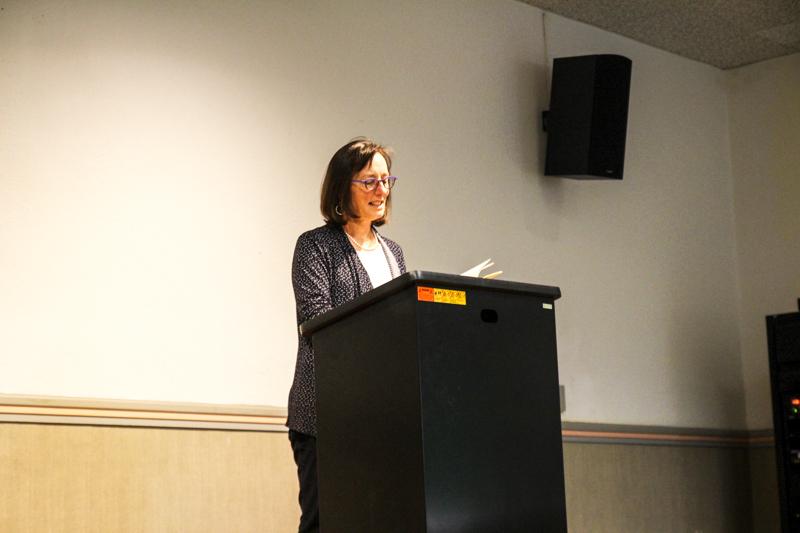‘Dear Committee Members’ Pokes Fun at Academic Hierarchy
Briana Santiago, Staff Photographer
Fiction writer Julie Schumacher, OC ’81, reads from her latest book, Dear Committee Members, in Wilder Hall Wednesday. The book, set on a college campus, is formatted as a series of recommendation letters.
April 15, 2016
Professor of Creative Writing Dan Chaon introduced fiction writer Julie Schumacher, OC ’81, with great pride Wednesday. Chaon informed the audience that Schumacher’s first published story, “Reunion,” was written to fulfill an undergraduate creative writing assignment at Oberlin before it was reprinted in The Best American Short Stories of 1983.
When Schumacher approached the podium, she reminisced about her time at Oberlin, noting how much more beautiful it was than she remembered. Suppressing a chuckle, Schumacher explained how she had decided to attend Oberlin when her father, an inveterate republican, called it “a red left school.” Schumacher then proceeded to thank Ana Cara, professor of Hispanic Studies, for having saved her Spanish major at Oberlin. After a semester abroad in Latin America, Schumacher had returned to Oberlin determined to study Latin American literature only to find that the Spanish department was teaching literature exclusively from Spain. Despite alienating the majority of the Spanish department by publishing an angry letter in The Oberlin Review, Schumacher was allowed to complete her major thanks to a seminar on Argentinian literature that Professor Cara set up for her.
Now a professor of Creative Writing and English at the University of Minnesota, Schumacher read from her latest book, Dear Committee Members, which won the Thurber Prize for American Humor. She said the book was borne out of her frustration with writing longer stories; previous attempts had petered out or grown stale. The solution came to her while giving advice to her Creative Writing students: “If you’re stuck and don’t know where to start, start with a form,” she told them. When asked if she’d ever started with a form herself, Schumacher realized she hadn’t. Since most of her students were graduating seniors who were asking her for recommendation letters, she decided she would write a novel consisting entirely of letters of recommendation. The novel is set on the campus of a large university. The protagonist, Jay Fitger, is a Creative Writing and English professor who Schumacher described as “a monstrous egotist … whose heart is in the right place.” Although lacking tact, Fitger promotes higher education and funding for the arts in his wry, witty letters of recommendation. The novel is tied together by Fitger’s blind backing of his student Darren Browles, whose ill-advised attempt to write an impressive homage to Herman Melville’s Bartleby by residing in a bordello outside of Las Vegas leads him into a gradual decline.
The reading itself was a feast of heady fun, teeming with witty remarks and delightful turns of phrase. In one instance, Jay finds himself writing a letter for a student applying to work at a grocery store. In it, the professor explains that the student received a B grade after writing a story about a drunken man stumbling into a ditch and groping his way out only to be captured by the slimy tentacles of a squid-like monster, which slowly mauls its way toward to the victim’s crotch. To end the letter, Jay quips, “You might want to start him in produce, rather than seafood or meat.”
Despite its humor, Dear Committee Members paints a bleak and realistic picture of higher education. In the novel, funding for the arts and humanities are being drained by STEM degrees and the English faculty is headquartered in a squalid and dangerous building undergoing renovations that once housed the Economics faculty, who “must be kept comfortable at all times.” Though Schumacher portrays feelings of disillusionment with academia, she still believes that there’s room for change. “I still have those hopes. I haven’t abandoned them,” she said. “You always feel like you’re pushing uphill in a higher art … but it matters too much to give up on it.”
Schumacher said she still writes recommendation letters, but that she does so fully aware that half of them won’t get read. “I’m sorry, Dan,” Schumacher said in response to Chaon’s grunt of disagreement, “but you know it’s true.”





















